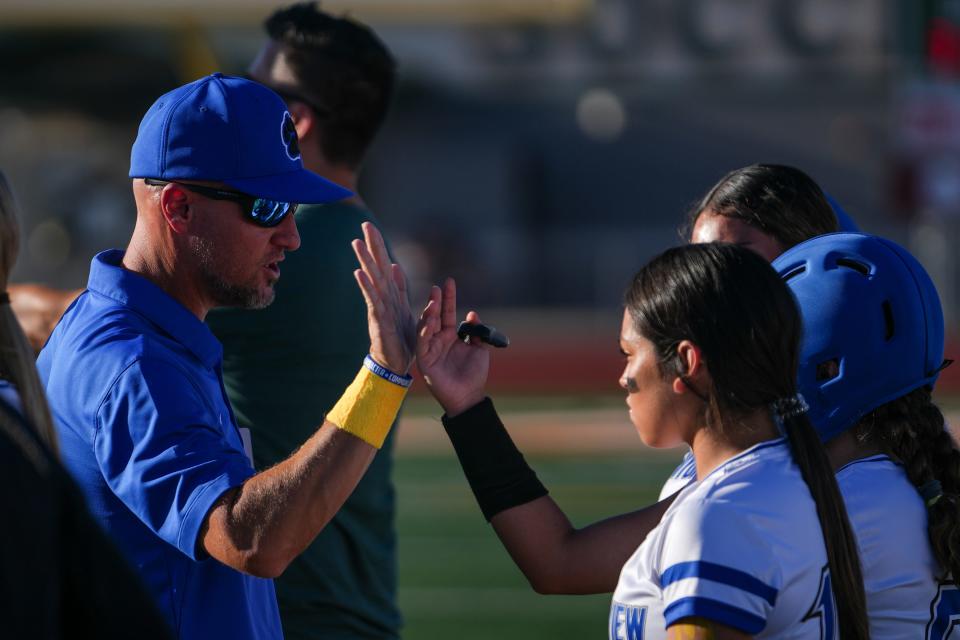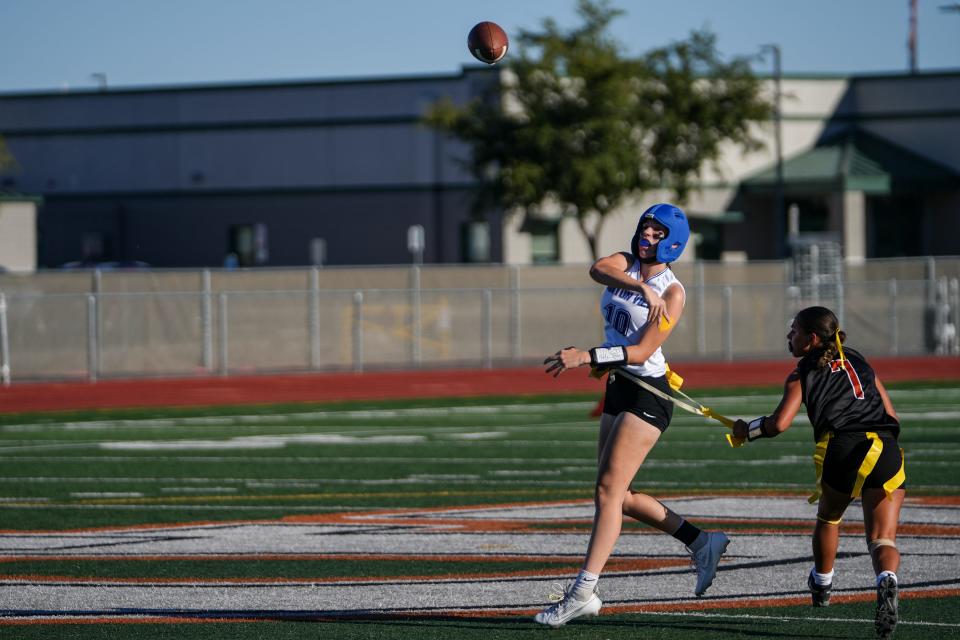How coaching flag football saved Canyon View's Cory Beal after suffering stroke
Cory Beal leads his Waddell Canyon View High School girls' flag football team through a practice on Labor Day. He shouts out instructions and gives encouragement.
The 46-year-old looks like the picture of health, passion and energy.
Beal seizes each day like it is his last after what he went through. It was more than a year ago, he found himself curled up in a fetal position in a grocery store aisle, sobbing uncontrollably. It was post-traumatic stress disorder fallout from suffering a stroke in January 2022, and not knowing why.
"I broke down in the bread aisle in my first venture out," Beal said. "I found out I was petrified of my stairs. Every stair felt like it was 10 feet tall. And I have like 30 stairs."

He knew the road back was going to be long, hard and scary.
Last school year was his first year returning to work full time, he said, "with doctor appointments and medication side effects being my new struggle, along with the grind of teaching."
Through therapy, physically and psychologically, he made it back in time to be master of ceremonies for Canyon View's first graduation in May 2022. That was his goal after the stroke.
But it was last May when he felt his life took a dramatic turn in a positive way. With the Arizona Interscholastic Association sanctioning girls flag football for the first time, his athletic director asked if he'd like to be the school's first flag football coach this fall, as a way to help with his recovery, physically and mentally.
He jumped at it.
"Coaching and being with my players has been the best possible medicine I could ask for and it drives me to keep getting better for them," Beal said.

Inspired by coach's journey
The girls know his story. He's shared photos of his step-by-step progression. And they're inspired to play their best.
"If he can get back and do stuff, then we can do anything," junior linebacker Maycie Bassett said.
Junior quarterback Katelyn Jewell, who returned from a preseason injury, showed how impactful she is to this team in the 35-0 win Tuesday over Gilbert Campo Verde, completing 20 of 26 passes for 322 yards and five TDs. She said Beal's enthusiasm has helped her progress to get back on the field.
"He's really excited for us," she said.
Beal, the instructional coach at Canyon View, had never been a high school athletics coach until now. That's been his antidote to keep himself going. But to get here, it's a crazy story.
Beal finds out rare blood disorder led to stroke
During Thanksgiving of 2021, he started having vertigo. He pulled over to the side of the road. During Christmas, he was in Hawaii with his wife and had a worse bout with vertigo. He couldn't sit up. He couldn't walk, He was throwing up.
It turned out, Beal later found out, that was a mini stroke.
"I didn't know that at the time," he said. "I was having a dizzy spell once a week. I went to the doctor. The doctor said, 'Hey, you're in your mid-40s, vertigo happens. Here are some things you can do to mitigate that.' "
But one day at school, while covering a class, he said "the whole world spun out of control."
"The next 24 hours, I'm throwing up every 45 minutes," Beal said. "The next afternoon, my wife, who works from home, I went to throw up. As I was coming out of the bathroom, I face planted on the floor. I passed out. She took me to the emergency room. Luckily, she advocated for a CT scan. The next thing I know I'm in an ambulance on my way to Barrow (Neurological Institute in Phoenix) and they told me, 'Hey, you had a stroke.' I saw the scan, and sure enough, you could see the stroke."
Beal said he spent the next four days in the hospital. He lost the use of his left arm and left leg. He said, "I felt like I was on a boat for three months." He could talk but his speech was slurred.
A month later, he got a call from Mayo. He met with a doctor there. What he thought would be a 30-minute consultation ended up being an all-day deal.
A few days later, Beal was back for a bone marrow biopsy, and it was confirmed he had a blood disorder called polycythemia vera. He said the bone marrow was overproducing blood, thickening enough to clog the arteries, which, he said, caused the stroke.
"She said, 'You were a ticking time bomb,' " Beal said. "She said, 'You were very fortunate not to have another stroke.' And it would have been way more severe."
Beal worked hard through physical therapy, while taking medication. Beal said his physical therapist told him that it would take a year to finally get back to feeling like his former self. He told him that was unacceptable.
"I will be at graduation, you tell me what to do, and I will do it," Beal said he told his physical therapist. "So you have three months to get me right. He said, 'OK, let's get to work.' I was in physical therapy three days a week, working out every day."
The PTSD didn't help matters.
"It was going to be scary, it's going to be difficult and it's going to require you to step out of your comfort zone," he was told.
Beal underwent physical therapy, occupational therapy and mental health therapy, he said. He had to convince himself he would be OK.
He has full use of his arms and legs. He does have to take an injection for the rest of his life every two weeks to regulate bone marrow production.
The team's motto is, "Small steps towards victory."
Beal is living proof.
To suggest human-interest story ideas and other news, reach Obert atrichard.obert@arizonarepublic.com or 602-316-8827. Follow him on X, formerly Twitter:@azc_obert
This article originally appeared on Arizona Republic: How coaching flag football saved Canyon View's Cory Beal

